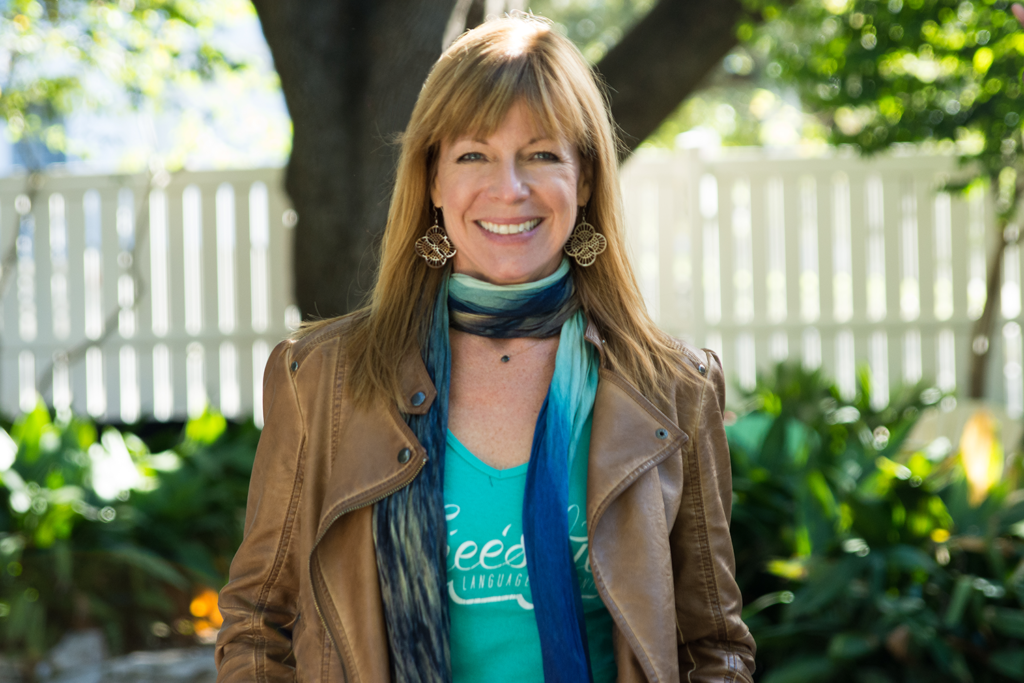Elizabeth Mack is flipping the script on language learning.
By Nicholas Barancyk, Photo courtesy of Freestyle Language Center

It’s Tuesday night and the lights are low. There’s the telltale pop of an opened wine bottle and soon the waiter is pouring sips of Chianti into several glasses. A teacher lifts a glass and asks her students, “Qual è il colore del vino?”
A wine bar may seem like an odd setting for a classroom, however, the Freestyle Language Center is unique in its approach.
“A huge part of our model is using the language in a context that interests you,” FLC Founder Elizabeth Mack says.
For her, that means tossing the textbooks aside and bringing back the culture.
Anatomy of a Francophile
After earning a Master of Arts degree in French literature from the University of Texas, Mack spent five years working as a French language professor. However, she soon found herself spend- ing more time calming stressed students than teaching them the benefits of language acquisition.
“Learning only takes place when you’re having fun,” she says.
That fun manifests for Mack when words intersect culture.
“You need speaking, but you don’t learn language just by speaking,” she says. “It also involves many cultural inputs.”
Sources like movies, music and slang are all roped into understanding how a foreign culture works. During her time at UT, Mack was famous in her department for sneaking French films like Amélie into course curriculum. When her classes started to fill every semester, she knew she was onto something.
So, in 2012, she put everything on the line. She left her university job, sold her house and shot for the moon, founding Freestyle Language Center.
“I didn’t know it would work,” she says, “but I knew what didn’t work.”
Since then, Mack has been remodulating and refining her curriculum, technology and teacher- training program. Dropping the stressors of academia, she’s focused the Freestyle philosophy on community.
“Language is a means to connect to people,” she says. “I wanted it to be about people.”
Class in session
Only four students showed up to Mack’s first class. However, it was a crucial test- ing ground for her media-based curriculum and teaching model, which moved emphasis from instructors to students.
“You don’t want to be the sage on the stage,” she says. “You want to be the guide on the side.”
It was a hit. In just 18 months, Free- style rocketed from four pupils to more than 100, with many beginners holding hour-long conversations by the end of the course.
A large part of Mack’s success is in the environment she’s created, one that’s low-stress, culturally relevant and community-oriented. It’s these reasons that a wine tasting in Italian and a museum tour in Spanish are so important, as they add an extra layer of significance to a language that’s otherwise lost in an academic setting.
A typical class boasts learners from 22 to 75 years old, college students to retirees. With such a wide array of demo- graphics, there’s no one type of person Mack is targeting. Instead, she says Freestyle is “for the curious-minded, the open-minded and the life learner.”
Going digital
Mack’s newest venture takes her media- oriented curriculum to the web. With online classes capped at 20 students, however, she separates Freestyle from big-box programs, remaining dedicated to keeping community at the forefront.
“I believe that sticking to the core principles will lead to its own path,” she says.
Sometimes all we need is a change of space, a different environment that flips our perspective and makes things click. That can be as complex as an immersion course or as simple as a glass of wine. Whatever it is, make sure it’s fun.

